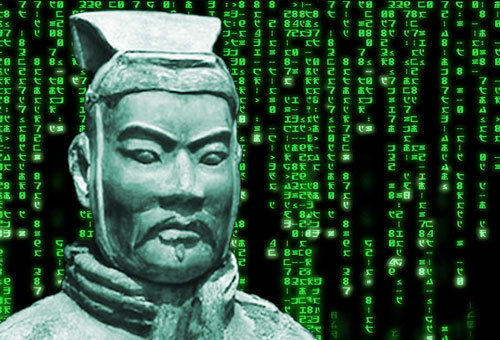MAO TSE-TUNG ON LEGALISM AND LORD SHANG
HOW CHINA'S ANCIENT PAST INFLUENCED ITS FUTURE

This, Mao's earliest known writing, is an essay he wrote in June 1912 when, after leaving the army, he had enrolled as a first-year student at the middle school in Changsha. His teacher thought so highly of this effort that he marked it for circulation among all members of the class; he also singled out many passages with circles, indicating approval of Mao's style, and dots, registering appreciation of the content.
The essay reveals an early admiration on Mao's part for the harsh ruling system of Chinese Legalism, a system Mao seems to have drawn inspiration from in developing his own political philosophy.
"HOW SHANG YANG ESTABLISHED CONFIDENCE BY THE MOVING OF A POLE"[1]
(June 1912)
When I read the Shi ji about the incident of how Shang Yang established confidence by the moving of a pole, I lament the foolishness of the people of our country, I lament the wasted efforts of the rules of our country, and I lament the fact that for several thousand years the wisdom of the people has not been developed and the country has been teetering on the brink of a grievous disaster. If you don't believe me, please hear out what I have to say.
Laws and regulations are instruments for procuring happiness. If the laws and regulations are good, the happiness of our people will certainly be great. Our people fear only that the laws and regulations will not be promulgated, or that, if promulgated, they will not be effective. It is essential that every effort be devoted to the task of guaranteeing and upholding such laws, never ceasing until the objective of perfection is obtained. The government and the people are mutually dependent ans interconnected, so how can there be any reason for distrust? On the other hand, if the laws and regulations are not good, then not only will there be no happiness to speak of, but there will also be a threat of harm, and our people should exert their utmost efforts to obstruct such laws and regulations. Even though you want us to have confidence, why should we have confidence? But how can one explain the fact that Shang Yang encountered the opposition of so large a proportion of the people of Qin?
Shang Yang's laws were good laws. If you look today at the four thousand-odd years for which our country's history has been recorded, and the great political leaders who have pursued the welfare of the country and the happiness of the people, is not Shang Yang one of the very first on the list? During the reign of Duke Xiao, the Central Plain was in great turmoil, with wars being constantly waged and the entire country was exhausted beyond description. Therefore, Shang Yang sought to achieve victory over all the other states and unify the Central Plain, a difficult enterprise indeed. Then he published his reforming decrees, promulgating laws to punish the wicked and rebellious, in order to preserve the rights of the people. He stressed agriculture and weaving, in order to increase the wealth of the people, and forcefully pursued military success, in order to increase the prestige of the state. He made slaves of the indigent and idle, in order to put an end to waste. This amounted to a great policy such as our country had never had before. How could the people not fear and trust him, so that he had to use the scheme of setting up the pole to establish confidence? From this we realize the wasted efforts of those who wield power. From this, we can see the stupidity of the people of our country. From this we can understand the origins of our people's ignorance and darkness during the past several millennia, a tragedy that has brought our country to the brink of destruction.
Nevertheless, at the beginning of anything out of the ordinary, the mass of the people always dislike it. The people being like this, and the law being like that (i.e., the people clinging to their old ways, and the law being directed toward radical change), what is there to marvel about? I particularly fear, however, that if this story of establishing confidence by moving the pole should come to the attention of the various civilized people of the East and the West, they will laugh uncontrollably so that they have to hold their stomachs, and make a derisive noise with their tongues. Alas, I had best say no more.
Source: Introductory note and text translation from Stuart R. Schram, ed., Mao's Road to Power: Revolutionary Writings, 1912-1949, vol. 1. (Armonk, NY: M.E. Sharpe, 1992), pp. 5-6.
[1] The tale to which the title of Mao's essay refers is the following:
"After the decree [incorporating his whole set of sweeping reforms] was drawn up Shang Yang did not at once publish it, fearing that the people did not have confidence in him. He therefore had a pole thirty feet long placed near the south gate of the capital. Assembling the people, he said that he would give ten measures of gold to anyone who could move it to the north gate. The people marveled at this, but no one ventured to move it. Shang Yang then said, 'I will give fifty measures of gold to anyone who can move it.' One man then moved it, and Shang Yang immediately gave him fifty measures of gold, to demonstrate that he did not practice deception."
This translation, cited by Schram, is from H.G. Creel, Chinese Thought from Confucius to Mao Tse-tung (London: Eyre and Spottiswoode, 1954), pp. 153-54.
To read the ancient Legalist texts and history to which Mao refers see the WFF's collection of Chinese Legalist Philosophy Texts (in English and Chinese)